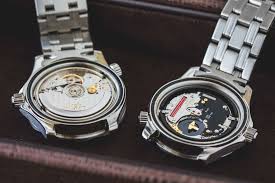Watches have always been more than just tools for telling time; they’re symbols of craftsmanship, engineering, and style. However, when it comes to precision, two main types of movements dominate the industry: quartz and mechanical. Understanding the differences between these movements is essential for watch enthusiasts and collectors alike.
The Mechanics Behind Quartz Movements
Quartz movements utilize the piezoelectric properties of quartz crystals to regulate timekeeping. These crystals vibrate at a specific frequency when an electric current is passed through them. This consistent vibration serves as a precise timekeeping mechanism. Quartz watches are powered by batteries, which provide the electrical energy needed to regulate the crystal’s oscillations.
One of the primary advantages of quartz movements is their remarkable accuracy. While individual quartz watches may vary, they typically lose or gain only a few seconds per month, making them incredibly reliable timekeepers. Additionally, quartz watches are less susceptible to external factors such as temperature watch movement types and physical shocks, further enhancing their accuracy and durability.
The Intricacies of Mechanical Movements
In contrast to quartz movements, mechanical movements rely on intricate systems of gears, springs, and escapements to measure time. There are two main types of mechanical movements: manual and automatic. Manual movements must be wound by hand, while automatic movements harness the motion of the wearer’s wrist to wind the mainspring automatically.
The craftsmanship involved in mechanical movements is often celebrated by watch aficionados. Skilled artisans meticulously assemble each component, ensuring precise alignment and functionality. However, the inherent complexity of mechanical movements means they are more susceptible to variations in accuracy compared to their quartz counterparts.
Precision vs. Tradition: A Delicate Balance
While quartz movements undeniably offer superior precision, mechanical movements hold a unique appeal rooted in tradition and craftsmanship. The intricate inner workings of a mechanical watch, visible through a transparent case back, evoke a sense of wonder and appreciation for the artistry involved.
Mechanical watch enthusiasts often embrace the slight variations in accuracy as part of the charm of owning a mechanical timepiece. They relish the ritual of winding their watches or marvel at the mesmerizing motion of the balance wheel ticking away the seconds.
Factors Affecting Precision
Several factors influence the precision of both quartz and mechanical watches. For quartz movements, the quality of the crystal and the precision of the electronic components play crucial roles. Additionally, the regularity of battery changes and the watch’s exposure to magnetic fields can affect its accuracy over time.
In mechanical movements, the skill of the watchmaker during assembly is paramount. Each gear must be meticulously aligned, and the escapement must function flawlessly to ensure accurate timekeeping. Furthermore, factors such as lubrication, temperature variations, and the wearer’s activity level can impact the performance of a mechanical watch.
The Evolution of Precision Timekeeping
Advancements in technology have led to improvements in both quartz and mechanical watch movements. Quartz watches now feature high-precision movements with additional features such as chronographs, alarms, and even GPS synchronization for ultimate accuracy.
Similarly, mechanical movements have benefited from innovations in materials and manufacturing techniques. Silicon components, for example, offer greater resistance to temperature changes and magnetism, enhancing the precision and reliability of mechanical watches.
Conclusion
In the debate between quartz and mechanical movements, precision is often the deciding factor for consumers. Quartz movements excel in accuracy and reliability, making them ideal for those who prioritize practicality and convenience.
However, the allure of mechanical movements lies in their craftsmanship, tradition, and the emotional connection they evoke. While they may not match the precision of quartz, the slight imperfections add to their charm, appealing to those who appreciate the artistry and heritage of watchmaking.
Ultimately, whether one prefers the precision of quartz or the tradition of mechanical movements, both types of watches serve as testaments to human ingenuity and craftsmanship, embodying the passage of time in their intricate mechanisms and timeless designs.
Top of Form
